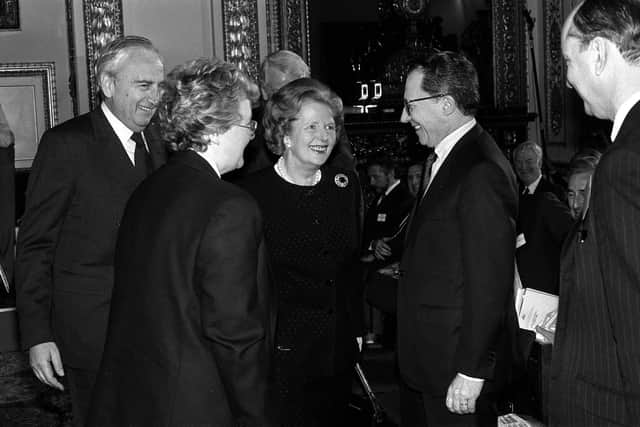What is Margaret Thatcher’s actual legacy as Prime Minister? - Andy Brown
Many will have fond memories of the work of Deputy Prime Minister Nick Clegg. I have him down as the person who promised faithfully that the LibDems would hold down tuition fees for students. Then proceeded to join a government that put them up by £6,000 a year before participating in an austerity drive for the poor accompanied by tax cuts for the rich.
Yet it is when we consider the consequences of Margaret Thatcher’s time in power that opinions differ most sharply. Judging the long-term impact of her headline policies is still hugely controversial.
Advertisement
Hide AdAdvertisement
Hide AdPeople tend to either love or hate the role she played in privatising state run businesses. Things are rarely that simple. Some privatisations work but others do not.


BT was once a slow changing part of a nationalised Post Office. It is now one of many competing parts of a vibrant British telecommunications industry. It is genuinely difficult to see how the changes in this sector could have moved forward as quickly and as flexibly if it had remained in state hands. Competition and choice in that industry is very genuine.
It is a lot harder to give a similarly positive assessment of the state of Britain’s water industry. There is absolutely no choice about who you buy your water from. If you object to their prices or don’t like the way that we are suffering from sewage releases not just into rivers but even onto the streets of Yorkshire there is not a single thing you can do about it and you won’t get much help from the industry regulator.
What is even more bizarre is that several of the privatised water companies are on the verge of bankruptcy. Which takes some doing when you know exactly how many customers you have years in advance. Privatisation has resulted in huge dividends being paid out, often to foreign shareholders, whilst debts have been piled onto the balance sheets. After walking away with a lot of our money these companies are now telling us we must pay higher bills to clear their debts. They have comprehensively failed to make the investments that privatisation was supposed to deliver.
Advertisement
Hide AdAdvertisement
Hide AdNor is that the only privatisation which has failed. Whenever there has been a natural monopoly supplier such as in the energy or rail industries it has proved rare for the private operator to deliver genuine improvements in value for money. To many people it seems that all we have ended up with is spiralling prices and a mess of different operators.
Mrs Thatcher’s legacy is also pretty mixed when it comes to council house sales. A lot of people got genuine benefits from buying their council house and many localities were visibly improved by having a group of new private owners investing in their properties.
Yet the money that was received by the government from those sales was never ring fenced to build more council homes. It was simply frittered away. That resulted in decades of declining numbers of council houses which has been one of the main causes of the current problems in the housing market. There simply aren’t enough council houses for young people who can’t afford to buy and that is the direct result of Margaret Thatcher’s legacy.
When it comes to the economy there are also mixed opinions. Some admire her for taking on the unions and bringing them under control. Others, like me, think that the key reason union power was weakened was that large parts of our manufacturing industry were killed off. We are still suffering from the consequences of that.
Advertisement
Hide AdAdvertisement
Hide AdA case can be made that it is better for Britain to live off financial services than polluting heavy industry. A much better case can be made that we lost more of our manufacturing industry than was either necessary or good for the country and we are now dangerously over dependent on imports.
Then there is the small matter of getting rid of pesky regulations. Sometimes that is the right thing to do and genuinely helps our businesses and our society. It is, however, very hard to make an argument that stripping out proper controls over the building industry had a positive impact. The Grenfell fire revealed the consequences in lives and in money of shoddy work being signed off by weakened regulators.
And there was one other rather important removal of pesky regulations. Margaret Thatcher was the woman who launched the Big Bang in the financial services industries which gave free reign to speculators. Who proceeded to gamble with other people’s money so recklessly that they paved the way for that horrible boom and bust.
There is therefore a case for saying that her biggest legacy is a great deal of debt.
Andy Brown is the Green Party councillor for Aire Valley in North Yorkshire.
Comment Guidelines
National World encourages reader discussion on our stories. User feedback, insights and back-and-forth exchanges add a rich layer of context to reporting. Please review our Community Guidelines before commenting.